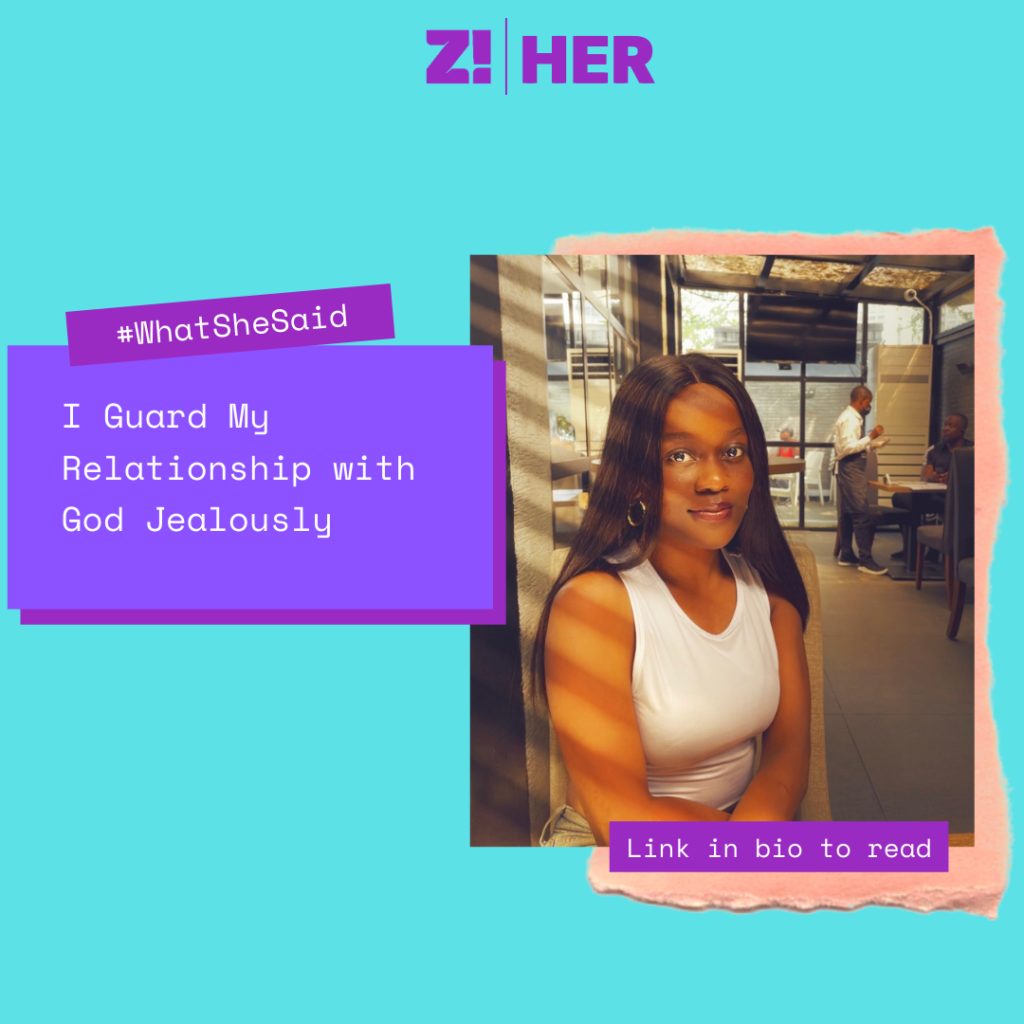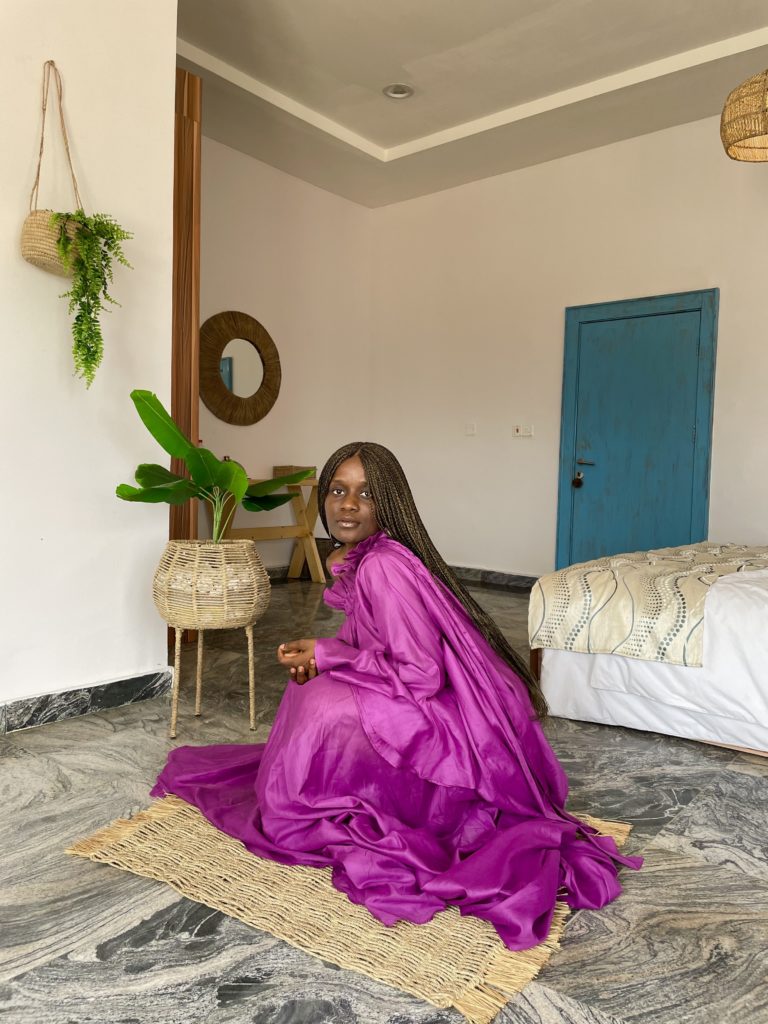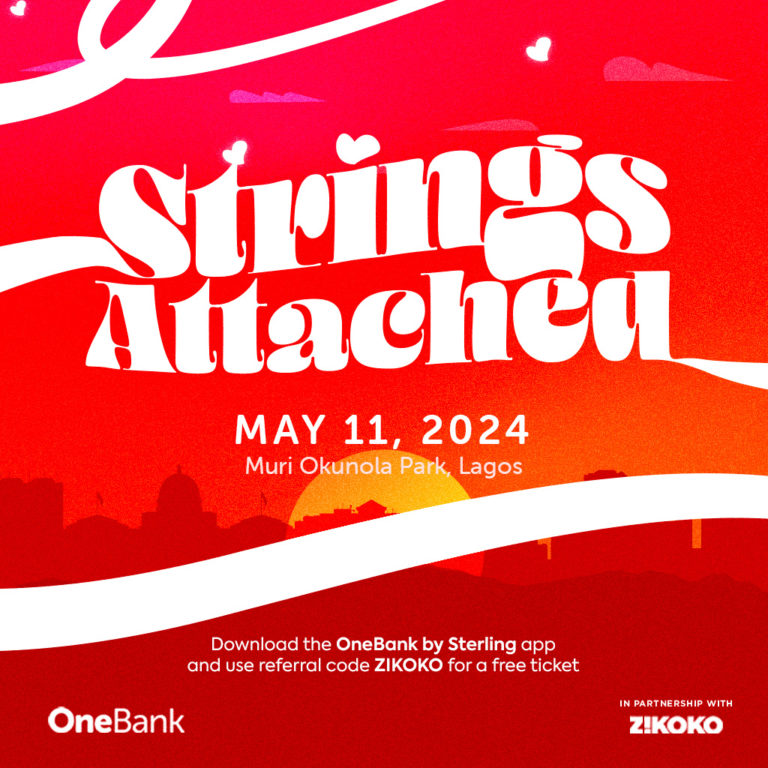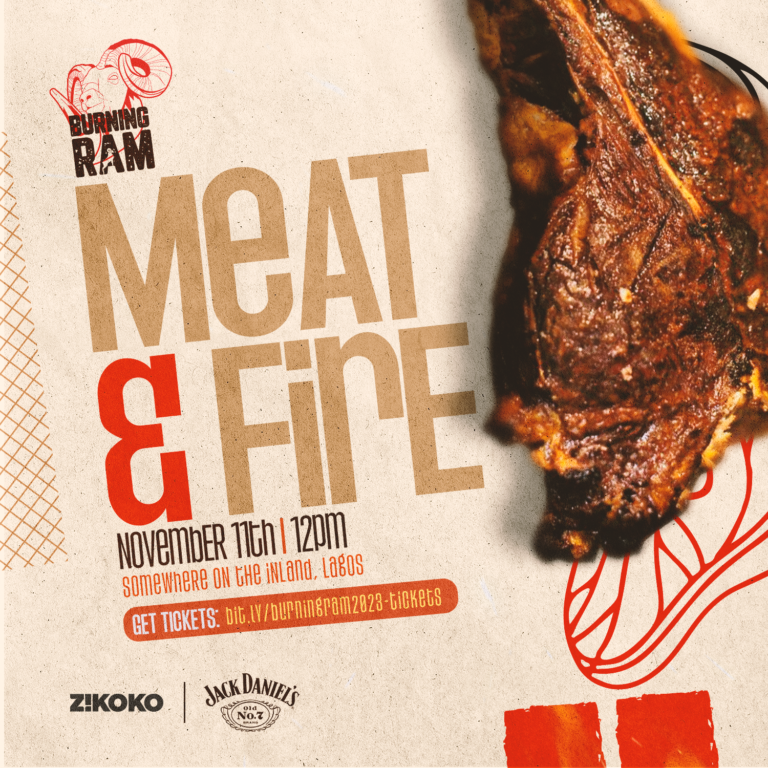This week’s What She Said is Koromone Koroye, a 30-year-old Nigerian woman. She talks about attending Pentecostal churches when growing up because of her radical, religious father; her experiences with Nigerian Christian communities and her relationship with God.

You have the floor.
In my first phase of spirituality, my relationship with church was connected to my parents. My mum was a Christian, but my dad wasn’t interested. Then later, he became a Christian, and we moved from Household of God to Mountain of Fire and Miracle Ministries (MFM) — both pentecostal churches. When you are a Nigerian child and your parents are Christians, you go to church until you’re at the age where they can’t control you anymore.
Why did your dad become a Christian?
He had a radical experience. I was still a baby, but my mum told me the story. He was sick, hospitalised and not getting better. At that time he worked at Citibank, and two of his colleagues who were pastors prayed for him. Then my dad had a vision where he saw someone dressed in white robes performing surgery on him. When he woke up from the vision, he got better.
Any idea why they moved to MFM?
I think, after his healing experience, my dad was like, “Oh my goodness. I need a church that can match my level of radicalness.” Whatever he saw at MFM spoke to this want.
He also told the pastors who prayed for him about his experience. And I think people who heard the testimony told him he had to take God seriously so he wouldn’t fall into the Devil’s trap again.
There wasn’t anything wrong with that, but it went a bit far. My siblings and I thought there was something off about the church. Once we grew older, we had questions about some practices. Like, why were there so many church programmes and fasting programmes?
Were there particular ways these practices affected you?
One time, we had to fast. We would start fasting at 6 a.m. and break at 6 p.m. — we were kids going to school. On the last day of the fast, which was Friday, we had to do a dry fast from the day before to break Friday afternoon at church.
Before they let us break our fast, we did this crazy prayer. They passed around black nylon bags and were like, “We’re going to pray now. You’re going to start coughing everything out.”
Coughing what?
I don’t know. All around me, kids were just coughing. My siblings and I held our nylon bags, confused. We were the only ones not coughing, and we didn’t want them to think we were possessed. So we joined them.
We also had a lot of routines. Every first Saturday of the month, we’d go to Prayer City of Ibadan expressway to pray for three, four hours while fasting. Imagine being a child growing up in this environment where every first Saturday, you had to do this awful trip to go pray prayers you don’t even connect with. And if you didn’t pray, they’d ask you what was wrong with you.
What changed?
Just before I went to college, at 15, my older brother rebelled. He decided he wasn’t going to our parents’ church anymore. He discovered “This Present House”, a church at the end of Freedom Way in Lekki, and took us there. A lot of us were young. We would sit in a circle and the young pastor would talk to us about real stuff and ask us questions. I loved it, but I still came home to super religious parents, so stuff he said about God was not connecting. I thought, “Where is the fire prayer?”
This disconnect continued until I got into college in the US. There, I stopped going to church. I believed in God, but not that Jesus was the Lord and Saviour. Sometimes I’d find myself talking to God about stupid things I did.
When I was done with school and started working, I moved to an area that was a black community, and I was introduced to the Baptist church. In Baptist churches, there’s a lot of clapping and dancing — it was so pentecostal but in a different way. There, I realised there is something called the Holy Spirit. These guys would know things about you and pray over you concerning those things and I’d be like, whoa, what’s this?
My experience there led me to do some research. As I read the Bible, my relationship with God grew. Nobody “led” me to Christ. I just found myself being like, “This makes sense and I think I learnt it wrong for a long time.”

Did this change when you moved back to Nigeria?
When I moved back to Nigeria, I decided to visit This Present House. This time, they now had a church for millennials and Gen Zs called The Waterbrook Church (TWB). My first Sunday there, I was like, “Oh my God, this is where I belong.” It was like a grown-up version of what we had before. I fell in love with the church, the people, and I threw myself in. I would attend services and prayer meetings. At some point, even my parents noticed.
TWB introduced me to Christian communities and how good they could be when done right. Unfortunately, they didn’t train us well enough. They made people pastors before they were ready, and as a result, things got corrupt — ego and competition to be better than other churches got in the way. It stopped being about fellowship and became about how many people can come. So I slowly began to detach.
I’d space out during meetings. I lost that love I had. A lot of things happened afterwards, inappropriate relationships, drama… It was crazy.
That sounds messy.
It was. And then my dad passed.
Then I realised that the whole “community” they talked about wasn’t real because out of about 20 to 30 people I used to pray with, only one person regularly checked up on me.
That’s awful.
I’d never forget: my dad passed on a Sunday morning at 1 a.m. I sent a text to three of my pastors. I went to church, people sent in condolences, and after that day, I didn’t see them again. So many hurtful things happened after my dad died and I was looking to my church community to hold me up and they did not. Between 2017 and 2019, I lost my love for life.
I’m sorry.
It was really crazy. Because my first contact with Jesus Christ was through people, I disconnected when they failed me.
And then what changed?
In 2020, I saw this sponsored post on Instagram about an 8-week intensive discipleship course on operating with the gift of the spirit. I was interested. When I saw eight weeks, I was like, “Yes, I love a challenge.”
When I signed up, I told God, “If this doesn’t work, I am not interested in church again.” I would be fine with just reading my Bible and praying. On the first day, the teacher said “I’m not here to pastor or baby you. Take this course as you would a school course.” He asked why we signed up, and I told them I was there because I was bored with the routine. I thought there was more to God and Nigerian Christians were not going about it the right way. I told them I was reading the Bible and not seeing the actions being replicated by Christians. And if the class didn’t work, I would tell them bye-bye. They laughed.

Subscribe to our newsletter here.
The first week, we read three books, answered questions and did a treasure hunt. A treasure hunt meant we prayed to receive clues of words of knowledge, which are pieces of information that you know about someone that you would not have known if they didn’t tell you. I was like, not bad.
By the third week, I was like, “Yo, things are happening.” I was seeing, hearing things. People were calling me saying, “Oh my goodness, you’re so prophetic. You said this thing and it was true.” The course was so intense. We were reading these referred books, practising what we read, having meetings during the week and praying a lot.
In this phase of my spirituality, I saw God as God the Father, the Son and the Holy Spirit. This was before the pandemic, so we would go out, pray and lay hands on people, do assignments, then meet on Saturdays for four, five hours, crazy. The best part was I was surrounded by people who were as radical as I was — but not MFM kind of radical — it was pure love for God; we did not like church. But this changed for me.
The course ended in March 2020, and a month after, the dean reached out to me about a fellowship he was part of. He asked if I wanted to join and I did. Slowly, I got invested. They had this prayer call at 3 a.m., and the day I joined, the call lasted four hours. Halfway through May, they introduced a prayer watch that included meeting four times a day. Because I’m a writer, I was assigned as a scribe. My job was pretty much taking down minutes as prayer points, prayer requests, etc.
Because I volunteered to do this, people started paying attention to me — they would even ask for my opinion of stuff. Before I knew it, I was part of the community. In the beginning, I was like, “I don’t trust you guys. I don’t know yall o.” But they were relentless.
Now, I’m in this place where I’m a part of a community. I still don’t go to church, but my relationship with God is special. I guard it jealously; I do not allow people taint my understanding of God.
Sweet. I’m curious about how your parents’ relationship with Christianity metamorphosed alongside yours.
Something interesting happened with my dad. Three years before he passed, we noticed he became lax with church services. Some Sundays, I’d be off to church and he just be in the living room. It was so weird, but we ignored it.
At some point, he stopped completely. No more prayers; not even at home. I found out later he had given a lot of money to the parish for some building to be done. Since he worked in banking, they also needed his financial advice and he supplied this. But when he needed help with some prayers, they turned him down rudely. He was very hurt by that because he had given his time and finance to the church.
My mum kept going, but after my dad died, she went back to Household of God. Her reason was that the following year when we wanted to do an anniversary service of his death at the church — which my father also helped build — they said no. They refused because we didn’t “remember them” after the funeral. That was the last straw for my mum; she was tired of religious protocol and probably wanted her freedom to worship God without rules and rigid doctrine.
For more stories like this, check out our #WhatSheSaid and for more women like content, click here




